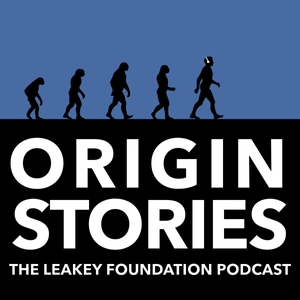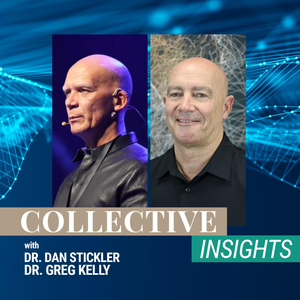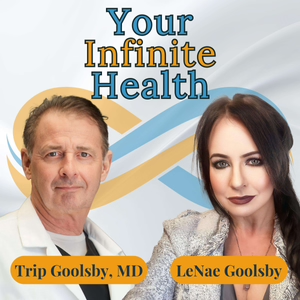
#318 Genetics Wrapped 2024: Top Advances in Genomic Medicine
12/06/24 • 49 min
To celebrate the year coming to an end, we are reflecting back on the top genetics and genomics
Bruce D. Gelb, M.D. is the outgoing President of the American Society of Human Genetics (ASHG). He is also the Director and Gogel Family Professor of the Mindich Child Health and Development Institute at the Icahn School of Medicine at Mount Sinai. He is Professor of Pediatrics and of Genetics and Genomic Sciences. Dr. Gelb completed a pediatric residency and pediatric cardiology fellowship at Babies Hospital of Columbia-Presbyterian Medical Center and Texas Children’s Hospital at the Baylor College of Medicine, respectively. He joined the faculty at Mount Sinai in 1991 after fellowship and has remained there since. He developed and now oversees an extensive program in genomics/gene discovery for congenital heart disease. Dr. Gelb has received the E. Mead Johnson Award from the Society for Pediatric Research and the Norman J. Siegel New Member Outstanding Science Award from the American Pediatric Society. He was elected to the American Society of Clinical Investigation and the National Academy of Medicine (formerly, the Institute of Medicine). Dr. Gelb is the President for the American Pediatric Society, Immediate Past President for the International Pediatric Research Foundation and Treasurer-Elect for the American Society of Human Genetics. In addition to his research, he co-directs the Cardiovascular Genetics Program at Mount Sinai.
Dr. Eric Green is the director of the National Human Genome Research Institute (NHGRI) at the U.S. National Institutes of Health (NIH). As NHGRI director, Dr. Green leads the Institute's research programs and other initiatives. He has played an instrumental leadership role in developing many high-profile efforts relevant to genomics. Dr. Green received his B.S. degree in bacteriology from the University of Wisconsin - Madison in 1981, and his M.D. and Ph.D. degrees from Washington University in 1987. Coincidentally, 1987 was the same year that the word “genomics” was coined. Dr. Green’s relationship with the Institute began long before his appointment as director. He served as the Institute’s scientific director (2002 - 2009), chief of the NHGRI Genome Technology Branch (1996 - 2009) and founding director of the NIH Intramural Sequencing Center (1997 - 2009). Prior to that, he played an integral role in the Human Genome Project. Dr. Green is a founding editor of the journal Genome Research (1995 - present) and a series editor of Genome Analysis: A Laboratory Manual (1994 - 1998), both published by Cold Spring Harbor Laboratory Press. He is also co-editor of Annual Review of Genomics and Human Genetics (since 2005). Throughout his career, he has authored and co-authored over 385 scientific publications.
Dr. Green is a recurring guest on DNA Today, and he might hold the title as the guest who has been on the show the most times! He was featured on Episode #182 when we chatted about the Human Genome Project and the recent completion of the human genome sequence -- from telomere to telomere. Dr. Green was a panelist on the PhenoTips Speaker Series installment that our host Kira Dineen moderated about population genomics in clinical practice, this was also released on the DNA Today podcast feed as Episode #260. He was also on the last couple years for our genetics wrapped 2022 (#214) and 2023 (#263).
Stay tuned for the next new episode of DNA Today next Friday! New episodes are released every Friday. In the meantime, you can binge over 300 other episodes on Apple Podcasts, Spotify, streaming on the website, or any other podcast player by searching, “DNA Today”. Episodes since 2021 are also recorded with video which you can watch on our YouTube channel, this includes some episodes recorded at NBC Universal Stamford Studios.
DNA Today is hosted and produced by Kira Dineen. Our video lead is Amanda Andreoli. Our social media lead is Kajal Patel. Our Outreach Intern is Liv Davidson. And our logo Graphic Designer is Ashlyn Enokian, MS, CGC.
See what else we are up to on
To celebrate the year coming to an end, we are reflecting back on the top genetics and genomics
Bruce D. Gelb, M.D. is the outgoing President of the American Society of Human Genetics (ASHG). He is also the Director and Gogel Family Professor of the Mindich Child Health and Development Institute at the Icahn School of Medicine at Mount Sinai. He is Professor of Pediatrics and of Genetics and Genomic Sciences. Dr. Gelb completed a pediatric residency and pediatric cardiology fellowship at Babies Hospital of Columbia-Presbyterian Medical Center and Texas Children’s Hospital at the Baylor College of Medicine, respectively. He joined the faculty at Mount Sinai in 1991 after fellowship and has remained there since. He developed and now oversees an extensive program in genomics/gene discovery for congenital heart disease. Dr. Gelb has received the E. Mead Johnson Award from the Society for Pediatric Research and the Norman J. Siegel New Member Outstanding Science Award from the American Pediatric Society. He was elected to the American Society of Clinical Investigation and the National Academy of Medicine (formerly, the Institute of Medicine). Dr. Gelb is the President for the American Pediatric Society, Immediate Past President for the International Pediatric Research Foundation and Treasurer-Elect for the American Society of Human Genetics. In addition to his research, he co-directs the Cardiovascular Genetics Program at Mount Sinai.
Dr. Eric Green is the director of the National Human Genome Research Institute (NHGRI) at the U.S. National Institutes of Health (NIH). As NHGRI director, Dr. Green leads the Institute's research programs and other initiatives. He has played an instrumental leadership role in developing many high-profile efforts relevant to genomics. Dr. Green received his B.S. degree in bacteriology from the University of Wisconsin - Madison in 1981, and his M.D. and Ph.D. degrees from Washington University in 1987. Coincidentally, 1987 was the same year that the word “genomics” was coined. Dr. Green’s relationship with the Institute began long before his appointment as director. He served as the Institute’s scientific director (2002 - 2009), chief of the NHGRI Genome Technology Branch (1996 - 2009) and founding director of the NIH Intramural Sequencing Center (1997 - 2009). Prior to that, he played an integral role in the Human Genome Project. Dr. Green is a founding editor of the journal Genome Research (1995 - present) and a series editor of Genome Analysis: A Laboratory Manual (1994 - 1998), both published by Cold Spring Harbor Laboratory Press. He is also co-editor of Annual Review of Genomics and Human Genetics (since 2005). Throughout his career, he has authored and co-authored over 385 scientific publications.
Dr. Green is a recurring guest on DNA Today, and he might hold the title as the guest who has been on the show the most times! He was featured on Episode #182 when we chatted about the Human Genome Project and the recent completion of the human genome sequence -- from telomere to telomere. Dr. Green was a panelist on the PhenoTips Speaker Series installment that our host Kira Dineen moderated about population genomics in clinical practice, this was also released on the DNA Today podcast feed as Episode #260. He was also on the last couple years for our genetics wrapped 2022 (#214) and 2023 (#263).
Stay tuned for the next new episode of DNA Today next Friday! New episodes are released every Friday. In the meantime, you can binge over 300 other episodes on Apple Podcasts, Spotify, streaming on the website, or any other podcast player by searching, “DNA Today”. Episodes since 2021 are also recorded with video which you can watch on our YouTube channel, this includes some episodes recorded at NBC Universal Stamford Studios.
DNA Today is hosted and produced by Kira Dineen. Our video lead is Amanda Andreoli. Our social media lead is Kajal Patel. Our Outreach Intern is Liv Davidson. And our logo Graphic Designer is Ashlyn Enokian, MS, CGC.
See what else we are up to on
Previous Episode

#317 Prenatal Mock Genetic Counseling Session
We're excited to release our second installment in our new Mock Genetic Counseling Session series! In this installment, our host Genetic Counselor Kira Dineen and student Annette Grynspan perform a mock prenatal genetic counseling session. This prenatal session’s indication is one of the most common: advanced maternal age (AMA).
This session was recorded in person, providing a more dynamic and engaging learning experience therefore, we highly recommend watching it on YouTube to fully immerse yourself in the interaction.
We hope this series is helpful for prospective and current genetic counseling students, as well as the general public, by demystifying the genetic counseling process. Understanding how these sessions work can empower individuals and provide valuable educational insights into this critical healthcare service.
Kira Dineen, MS, LCGC, CG(ASCP)CM (she/her) has over a decade of podcast experience fueled by a passion for science communication. She has hosted and/or produced 10 podcasts most notably DNA Today, Journal of Genetic Counseling's DNA Dialogues, N-Lorem's Patient Empowerment Program, Phenotips Speaker Series: A Genetic Podcast, It Happened To Me: A Rare Disease and Medical Challenges Podcast and others.
For the past 4.5 years she has also served as the prenatal genetic counselor at a high risk pregnancy private practice in Connecticut for over four years. She was accepted into The Podcast Academy and previously served on the National Society of Genetic Counselor’s Digital Ambassador program. Kira received her Diagnostic Genetic Bachelor’s of Science degree at the University of Connecticut and is a certified Cytogenetic Technologist. She received her Master’s of Science at Sarah Lawrence College.
Dr. Annette Grynspan (she/her) is an international medical graduate from Costa Rica with 14 years of experience in clinical care, research, and healthcare administration. She earned her Bachelor of Science in Neuroscience from the University of Michigan, Ann Arbor, and her Doctor of Medicine from the Universidad Autónoma de Guadalajara. Currently, she is a second-year student in the Joan H. Marks Graduate Program in Human Genetics at Sarah Lawrence College. Fully bilingual in English and Spanish, Dr. Grynspan excels at communicating complex medical concepts and building relationships within diverse communities.
Passionate about genetics, Dr. Grynspan focuses on personalized medicine and public health initiatives. Her upbringing in Costa Rica has fueled her commitment to health equity and empowering individuals with genetic knowledge for informed decision-making. With strong analytical skills and a detail-oriented approach, she aims to advance patient outcomes and advocate for underserved populations making a meaningful impact in the field of genetic counseling. The premise of this mock case was Dr. Grynspan’s work as part of her internship with DNA Today.
Mock Prenatal Genetic Counseling Session Outline- Contracting
- Greetings and introductions.
- Overview of the session: pregnancy history, symptoms, family history, genetic screening options, ultrasound preview, and addressing questions.
- Concerns about age-related risks for chromosomal conditions.
- Explanation of egg retrieval age vs. delivery age for risk assessment.
- Confirm due date, conception method, LMP and/or transfer date, etc.
- Pregnancy symptoms, exposures, and medical history review.
- Maternal/paternal conditions and relatives' health details.
- NIPS: Non-invasive blood screening to detect chromosomal conditions.
- CVS/Amnio: Diagnostic procedures, risks, timing, and testing options.
- Schedule around 13 weeks to measure the nuchal translucency (NT) and presence or absence of the nasal bone for indicators of chromosomal conditions.
- Review next steps: NIPS consent, blood draw, and future appointments.
- Results will be provi...
Next Episode

#319 New CPT Code 96041 Explained: 2025 Billing for Genetic Counselors
With 2025 right around the corner, we are discussing the brand new CPT Code 96041 that will be effective January 1st, 2025. This is a game-changer for the genetic counseling profession, and we have two experts to break it down for us.
Dr. Colleen Campbell is in the last weeks of her NSGC presidency. She also serves as the Director of Genetic Counseling Operations for University of Iowa Health Care. We’re also joined by Brian Reys, a cancer genetic counselor and manager at UT Southwestern’s Cancer Genetics Program. He also serves as a CPT Coding Advisor to NSGC. Colleen and Brian will explain how this new code affects billing and what genetic counselors need to know for 2025!
On This Episode We Discuss:- Key Differences: Explained the shift from "face-to-face" to "total time" billing between codes.
- Why the Change? Discussed the reasons behind the update and its necessity for the field.
- Total Time Billing: Detailed how this impacts documentation and billing.
- Billable Activities: Highlighted activities now eligible for billing under 96041.
- Expanded Access: Explored how telehealth eligibility broadens access to genetic counseling.
- Best Practices: Provided tips for accurate time documentation.
- The 50% Rule: Explained the significance and implications.
- Payer Reimbursement: Discussed potential hurdles and advocacy strategies.
- Medicare and Medicaid: Analyzed coverage limitations and the path to Medicare recognition.
- State-Specific Medicaid Policies: Emphasized the importance of understanding local regulations.
- Multiple Provider Encounters: Explained how the new code applies in complex scenarios.
- Student Involvement: Discussed billing practices during supervised encounters.
- Institutional Adoption: Provided guidance for clinics and institutions.
- Collaboration: Highlighted the importance of working with billing and compliance departments.
- NSGC's Role: Discussed the organization's efforts to educate stakeholders.
- Individual Advocacy: Encouraged listeners to actively advocate for the new code.
- Real-World Application: Walked through a hypothetical patient interaction to illustrate time documentation and billing.
- GCA Value: Discussed the potential impact of 96041 on GCA roles.
- Independent Provider Status: Explored the potential implications for genetic counselors' recognition.
- Integration into Healthcare: Discussed the role of 96041 in mainstream healthcare.
- Final Advice: Offered concluding advice for genetic counselors and billing departments.
Colleen A. Campbell, PhD, MS, LGC, serves as the 2024 President of the National Society of Genetic Counselors. She also serves as the Director of Genetic Counseling Operations for University of Iowa Health Care where she oversees the administration, standardization and continuous improvement of genetic counseling operations across the health system. In addition, she is a Clinical Associate Professor in the university’s Department of Internal Medicine. Dr. Campbell is an experienced clinician, researcher and educator in clinical genetics, and a recognized leader in the genetic counseling community for her passionate work growing the genetic counseling workforce in underserved areas and advocacy work. She led the successful Iowa legislative effort to license genetic counselors and is actively involved with H.R. 3876/ S.2323 the Access to Genetic Counselor Services Act, to improve patient access to genetic counseling services. Some highlights of her presidential term include leading the development of the 2025-2027 NSGC Strategic Plan, convening the global genetic counseling community in conversations about the global genetic counselor workforce, and leading the development of a four-prong approach to improve reimbursement for genetic counselor services. As a result of her work, she was awarded the 2018 National Society of Genetic Counselors Strategic Leader Award, 2020 Sarah Lawrence College Joan H. Marks Graduate Program in Human Genetics Distinguished Alumna Award, and 2024 Saint Mary’s College Distinguished Alumnae Award.
Brian Reys, M.S., CGC, joined UT Southwestern Medical Center’s Cancer Genetics Program in 2015. He sees patients at multiple UT Southwestern clinics. He completed his Master of Science degree in medical genetics and genetic counseling at the University of Cincinnati Genetic Counseling Program in 2013. During his training, he completed a specialized internship in cancer genetics with the Cedars Sinai, GenRISK program in Los Angeles. Prior to moving to Texas, he worked as a genetic counselor in Southern California in the areas of prenatal, pediatric, and cancer genetic...
If you like this episode you’ll love
Episode Comments
Featured in these lists
Generate a badge
Get a badge for your website that links back to this episode
<a href="https://goodpods.com/podcasts/dna-today-a-genetics-podcast-72285/318-genetics-wrapped-2024-top-advances-in-genomic-medicine-79513717"> <img src="https://storage.googleapis.com/goodpods-images-bucket/badges/generic-badge-1.svg" alt="listen to #318 genetics wrapped 2024: top advances in genomic medicine on goodpods" style="width: 225px" /> </a>
Copy




